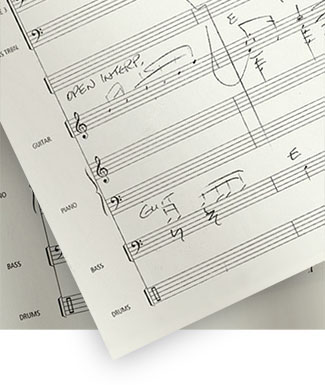
Solos in the tenor 2 and trumpet 2 (with electronics) parts.
5 reeds, 4 trumpets (harmons/cups and flügel in trpt 1), 3 trombones (bucket/harmon/cup), 1 bass trombone (bucket), accordion, guitar (electronics/pedals for effects), piano, bass (arco with a clip-on mic on music stand for close-mic effects on intro, drums (drummer also plays waterphone played with bow on intro)
Recorded on Data Lords, "CQ CQ, Is Anybody There?" tries to capture the mystery of ham radio, a precursor in some ways to the internet. Morse code being the first binary language (long and short beeps) being similar to 1's and 0's in the digital world), this is a commentary on a time where "connecting with the world" was accompanied by accountability, a code of ethics, and a business-free zone. Almost every rhythm in this piece is a Morse Code signal, spelling words like: greed, power, AI, data, CQ (seek you), help, SOS and more. A key is provided to each player to decode each rhythm. The is the most difficult piece to play on Data Lords. But, with the help of the tools I'm providing, for a good group (and with an astute 'sound-person') it is possible.
This piece needs close mics on the horns in the intro (and even on the bass and drums, who should each have a separate clip-on mic, one facing right into the waterphone handle and clips on the handle edge, and the other, right on the music stand to capture extra volume from the bass on the intro (almost like whale sounds on the recording). You will need a good guitarist, tenor soloist and drummer, as this piece gives them a lot of freedom on the first solo. This isn’t a piece for shy improvisers. Soloists should be interactive and mature in their soloing. The trumpet solo needs some creative experimentation on the solo section with sound and requires a player who can play interactively with the written score that is thick. I include a video discussion with the musician that helped program those trumpet sounds for me on this recording.
See full selection of Scores & Parts, categorized by difficulty, doubles, and solos.